Non-Sequiturs
-
 Non-Sequiturs
Non-SequitursNon-Sequiturs: 08.26.18
* Jane Genova explores the implications of Jones Day’s representation of the embattled Cardinal Donald Wuerl, former bishop of Pittsburgh. [Law and More]
* Why did President Trump (or his personal lawyers) allow White House Counsel Don McGahn to speak so freely to special counsel Robert Mueller? Here are some thoughts from veteran litigator Joel Cohen. [The Hill]
* As I recently discussed with Judge Jeffrey Sutton, Chevron-style deference to administrative agencies is being reconsidered in a number of states — and you can add Ohio to that list, as Eugene Volokh notes. [Volokh Conspiracy / Reason]
* Charles Glasser calls out the Washington Post for its selective invocation of the value of transparency. [Daily Caller]
* If you’re an ambitious law student or lawyer, then you need to watch your words on social media, as this report from Patrick Gregory makes clear. [Big Law Business]
* The justices will consider more than 1,000 certiorari petitions at the “long conference” on September 24 — and Adam Feldman identifies some of the standouts. [Empirical SCOTUS]
* Speaking of SCOTUS, if you’ll be in or near New Haven this coming Wednesday, please join me and Linda Greenhouse for a wide-ranging discussion of President Trump’s transformation of the federal judiciary. [Yale Federalist Society]
* The World Bank launches the world’s first BONDI, or “blockchain operated new debt instrument,” with an assist from King & Wood Mallesons. [Artificial Lawyer]
-
 Non-Sequiturs
Non-SequitursNon-Sequiturs: 08.19.18
* Charles Glasser proposes replacing “Trump Derangement Syndrome” with “Trump Obsession Syndrome” — which might be more accurate, but isn’t nearly as fun. [Daily Caller]
* Speaking of anti-Trump sentiment, here’s an interesting new ranking — from Adam Bonica, Adam Chilton, Kyle Rozema, and Maya Sen — showing just how liberal certain law schools are. [TaxProf Blog]
* Trying to date in law school? You’re looking for love in all the wrong places, according to 3L Korey Johnson. [Black Girl Does Grad School]
* Speaking of law school, here’s Kat Griffin’s roundup of the best blogs for women law students (with a shoutout to ATL; thanks, Kat!). [Corporette]
* An “Abolish ICE” t-shirt might not be very fashionable — but it is constitutionally protected speech, as Eugene Volokh explains. [Volokh Conspiracy / Reason]
* Joel Cohen wonders: should more states ban secret recording of conversations — and could the odious Omarosa be the catalyst for such change? [The Hill]
* Neha Sampat discusses the problem of “imposter syndrome” — and what we can all do to address it. [Attorney At Work]
* “Sex pigs halt traffic after laser attack on Pokémon teens.” Yeah, you know you wanna click…. [Instapundit]
* Where does your law firm fall along the AI adoption spectrum? Jean O’Grady lays out the stages. [Dewey B Strategic]
 Sponsored
SponsoredLegal AI: 3 Steps Law Firms Should Take Now
If 2023 introduced legal professionals to generative AI, then 2024 will be when law firms start adapting to utilize it. Things are moving fast, so…-
 Non-Sequiturs
Non-SequitursNon-Sequiturs: 08.12.18
* Thanks to the not-so-orphaned Kennedy clerks, this Term could see a record number of clerks at the Supreme Court, as Tony Mauro reports. [National Law Journal]
* Speaking of clerks, I talk quite a bit about them and their role in this interview with Kaley Pillinger about my writing career (from Underneath Their Robes to Above the Law to Supreme Ambitions (affiliate link)). [The Politic]
* Speaking of SCOTUS, and more specifically of Judge Brett Kavanaugh’s nomination to the high court, Ed Whelan responds to the arguments of Senate Democrats against — yes, against — the prompt provision of records from Kavanaugh’s years as White House counsel. [Bench Memos / National Review]
* If Judge Kavanaugh becomes Justice Kavanaugh, how will that affect the Court’s business jurisprudence? Adam Feldman has this analysis. [Empirical SCOTUS]
* The failure of Ryan Bounds’s Ninth Circuit nomination could be a “teachable moment” for Senator Tim Scott (R-S.C.), according to Will Folks. [FITSNews]
* Speaking of disappointing failures to confirm, Paul Mirengoff shares my frustration over the inexcusable delays in Department of Justice confirmations. [Power Line]
* It’s unfair to dismiss Seinfeld as “a show about nothing”; episodes offer insight into numerous legal issues — for example, the law of conspiracy. [Seinfeld Law]
* Kal Raustiala and Christopher Jon Sprigman offer interesting reflections on how data-driven authorship might affect the way we think about creativity and copyright. [Volokh Conspiracy / Reason]
* If you’re interested in litigation finance, there’s a conference coming up next month here in New York that you might want to check out. [LF Dealmakers Forum]
-
 Non-Sequiturs
Non-SequitursNon-Sequiturs: 08.05.18
* Joel Cohen tackles a tricky issue: how far should a lawyer go when defending a controversial client — e.g., Bill Cosby — in the court of public opinion? [Law and Crime]
* How much does being a conservative or libertarian hurt you when applying for a position as a law professor? James C. Phillips attempts to quantify the “rank gap.” [SSRN]
* Some thoughts on the case involving 3D-printer gunmaking instructions, from Eugene Volokh — who, not surprisingly, has a take that’s a bit more nuanced than Elie Mystal’s. [Volokh Conspiracy / Reason]
* Happy blogiversary to Artificial Lawyer — a great resource for anyone interested in the intersection of AI and the law. [Artificial Lawyer]
* C. Boyden Gray, a former White House Counsel, offers a clear and persuasive explanation of why seeing all the documents that Brett Kavanaugh sent or received during his time as White House Staff Secretary isn’t going to aid in evaluation of his SCOTUS nomination. [The Hill]
* From leading Supreme Court lawyer Lisa Blatt: “I’m a Liberal Feminist Lawyer. Here’s Why Democrats Should Support Judge Kavanaugh.” [Politico]
* And here’s more support for the SCOTUS nominee, from Kathryn Cherry, a former Kavanaugh clerk (and an African-American woman — one of Judge Kavanaugh’s many female or minority clerks).
https://www.youtube.com/watch?v=PBjEJPdAOPo&feature=youtu.be
-
 Non-Sequiturs
Non-SequitursNon-Sequiturs: 07.29.18
* Amy Howe has highlights from Judge Brett Kavanaugh’s completed questionnaire for the Senate Judiciary Committee — including the five different law firms where he worked as a summer associate. [SCOTUSblog]
* Despite Judge Kavanaugh’s impeccable qualifications, the battle to confirm him to the Supreme Court will be hard-fought — and Adam Feldman explains why. [Empirical SCOTUS]
* In other nominations news, Veronica “Ronnye” Stidvent, a prominent Latina lawyer, comes to the defense of Ryan Bounds, whose Ninth Circuit nomination was defeated last week. [Oregonian]
* Does the failure of the Bounds nomination spell trouble for the Kavanaugh nomination? Here are some thoughts from Elizabeth Slattery and me. [SCOTUS 101 / Heritage Foundation]
* Had he been confirmed, Ryan Bounds would have replaced his (and my) former boss, Judge Diarmuid F. O’Scannlain — who just penned a landmark Second Amendment opinion, Young v. Hawaii, that could very well wind up before SCOTUS (and allow the Court to settle a circuit spit). [Volokh Conspiracy / Reason]
* Speaking of the Ninth Circuit, Chris Walker has some concerns about the late Judge Stephen Reinhardt casting the deciding vote in an important tax law case, some four months after his passing. [Notice & Comment / Yale Journal on Regulation]
* Why is the internet such a cesspool today? Media lawyer Charles Glasser identifies five factors behind the decline (and gives a shoutout to Above the Law’s dearly departed comments section). [Daily Caller]
* Elsewhere in the First Amendment world, Joel Cohen and Dale Degenshein argue that it should be easier for parties to have documents sealed in litigation. [The Hill]
* If you appreciate the dying art that is the book review, check out Alice Lloyd’s beautifully written review of Robert Anthony Siegel’s Criminals: My Family’s Life on Both Sides of the Law (affiliate link), which paints a portrait of his father, Stanley Siegel — “a big-hearted and brilliant,” but deeply troubled criminal defense lawyer. [Weekly Standard]
-
 Non-Sequiturs
Non-SequitursNon-Sequiturs: 07.22.18
* Which lawyers write the best Supreme Court amicus briefs? Adam Feldman uses Ross Guberman’s BriefCatch tool to find out. [Empirical SCOTUS]
* In advance of Judge Brett Kavanaugh’s SCOTUS confirmation hearings, Carrie Severino has this handy roundup of eight important Kavanaugh opinions. [Bench Memos / National Review]
* Speaking of which, Professor Steve Vladeck raises some good possible questions for the nominee about the interaction between Morrison v. Olson and special counsel Robert Mueller’s investigation. [Lawfare]
* I don’t think Roe is getting overruled — but if it were to be overturned, what would happen to state abortion prohibitions that have not been officially repealed? [Josh Blackman]
* On that same subject, Professor Michael Dorf wonders: could Justice Thomas save abortion rights? [Take Care]
* Wherein Jonathan Adler and James Ho (now Judge James Ho) agree with Elie Mystal on the wrongness of that recent Washington Post op-ed about birthright citizenship. [Volokh Conspiracy / Reason]
* Is your legal department a “goat rodeo”? You’re not alone, according to Casey Flaherty. [3 Geeks and a Law Blog]
-
 Non-Sequiturs
Non-SequitursNon-Sequiturs: 07.15.18
* What’s it like to take the California bar exam as a 46-year-old law professor? Orin Kerr enlightens us. [Reason / Volokh Conspiracy]
* Charles Glasser points out the dangers involved in holding a speaker responsible for actions taken by listeners. [Daily Caller]
* In the Term that just ended, the Supreme Court tackled technology issues in a big way — and the implications are far-reaching, as J.P. Schnapper-Casteras explains. [Take Care]
* Elizabeth Slattery and I joined Laurence Colletti, guest host of the Lawyer 2 Lawyer podcast, to discuss Justice Anthony M. Kennedy’s SCOTUS retirement and the nomination of his successor, Judge Brett Kavanaugh. [Legal Talk Network]
* There has been a lot of speculation about how a Justice Brett Kavanaugh might move the Court to the right; Adam Feldman digs into the cases to make some educated guesses. [Empirical SCOTUS]
* What lessons could losing the Court teach the Democrats? Here are some thoughts from Seth Lipsky and David Leonhardt. [New York Post via Instapundit]
* And what lessons can lawyers learn from Judge Kavanaugh’s excellent writing? Ross Guberman identifies five of them. [Legal Writing Pro]
* Joel Cohen and Dale Degenshein explore what happens when a citizen “flips the bird” at the police (hint: it’s not a good idea). [Law and Crime]
* Congratulations to Thomson Reuters on the launch of Westlaw Edge, the latest version of its industry-leading legal research platform — which boasts a slew of new, artificial-intelligence-driven features, helpfully explained by Jean O’Grady. [Dewey B Strategic]
* And speaking of AI, congratulations to Fenwick & West on cutting the time for contract review in half, with the help of technology from Kira Systems. [Artificial Lawyer]
-
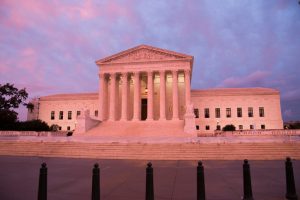 Non-Sequiturs
Non-SequitursNon-Sequiturs: 07.08.18
* After the D.C. Circuit, which circuit has produced the most justices who have joined the Supreme Court after 1900? The answer might surprise you. [Empirical SCOTUS]
* Here are thoughts on the SCOTUS shortlisters from my colleague Joe Patrice — who explains why it’s unlikely we’ll get another Souter. [The Takeaway / WNYC]
* Here are where the leading Court candidates stand on issues of admin law, courtesy of Chris Walker and company. [Notice & Comment / Yale Journal on Regulation]
* And here’s a response to my argument that liberals shouldn’t panic about SCOTUS, from San Francisco litigator Gordon Renneisen. [Law360]
* Leah Litman believes that the new justice spells trouble for Roe — but the specific reasoning for undermining Roe could take different forms. [Take Care]
* Josh Blackman explains why court packing would be neither feasible nor wise. [National Review]
* Veronica Root uses law clerk hiring as a jumping-off point to explain why diversity and compliance are deeply intertwined. [PrawfsBlawg]
* “Mysterious men and women in wizard-like robes make decisions in private that profoundly shape our lives.” Are we talking about SCOTUS, or… The Incredibles? [Gizmodo]
 Sponsored
SponsoredIs The Future Of Law Distributed? Lessons From The Tech Adoption Curve
The rise of remote work has dramatically reshaped the relationship between Lawyers and Law Firms, see how Scale LLP has taken the steps to get…-
 Non-Sequiturs
Non-SequitursNon-Sequiturs: 07.01.18
* Having placed Justice Anthony Kennedy’s Supreme Court retirement in political context, let’s now put it into historical context. [Retropolis / Washington Post]
* This makes some folks quite upset, but there’s no denying it: the Roberts Court is now truly the Roberts Court (and he probably isn’t thrilled about it either). [Empirical SCOTUS]
* Kathryn Haun — a former Kennedy clerk, by the way — has parlayed her expertise in Bitcoin, developed during her years as a federal prosecutor, into a new position leading Andreessen Horowitz’s $300 million fund focusing on cryptocurrency-related startups. Congrats, Katie! [Axios]
* Let’s not forget about President Trump’s transformation of the lower federal courts — because it’s not just about SCOTUS. [The Takeaway / WNYC]
* Check out Susman Godfrey’s new mandatory retirement policy — could this become the industry standard? [Texas Lawyer]
* Yes, the First Amendment is awesome and all — but is it also encouraging errors in news reporting, as Charles Glasser suggests? [Daily Caller]
* Speaking of mistakes, Ed Whelan sets Ben Shapiro straight on Judge Brett Kavanaugh, a leading contender to replace Justice Kennedy. [Bench Memos / National Review]
* President Trump says he wants to pick a SCOTUS nominee who could serve on the Court for 40 years or more — and if you take the five youngest names on his list of 25, it’s entirely possible. [Althouse]
* This should come as no surprise, but now law firms are joining the chase after data scientists. [Artificial Lawyer]
* Congratulations to the Practising Law Institute (PLI) and Fastcase, innovators in their respective spaces, on their new alliance. [Dewey B Strategic]
-
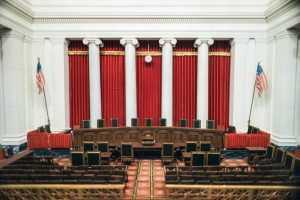 Non-Sequiturs
Non-SequitursNon-Sequiturs: 06.24.18
* It’s checkout time at the Supreme Court, and courtroom correspondent Mark Walsh is ready to reveal what’s in his shopping cart. [SCOTUSblog]
* Being cited by the Supreme Court is usually something to boast about — but not always, as Adam Feldman notes in this thoughtful analysis of how much oral arguments matter. [Empirical SCOTUS]
* Will Baude breaks down the Court’s intriguing debate over stare decisis in South Dakota v. Wayfair. [PrawfsBlawg]
* Joel Cohen looks at why the federal judiciary gets better treatment from the press than the other two branches of government — and whether the differential is justified. [The Hill]
* Orin Kerr identifies an interesting issue: if a police officer uses Google Translate to try and request consent to search from a non-English speaker in that person’s own language, is the consent valid if Google Translate botched the translation? [Volokh Conspiracy / Reason]
* There’s a long and bipartisan tradition of… the federal government spying on reporters, as Charles Glasser explains. [Daily Caller]
* Speaking of the media, Jean O’Grady points out a helpful new resource from CQ for consumers of news, along with tips for how to tell whether or not a story is “fake news.” [Dewey B Strategic]
* If reforms come to university boardrooms, let’s hope they include law schools as well. [ProfessorBainbridge via Instapundit]
* An interesting new use of voice-activated technology, courtesy of Wolters Kluwer: getting insights into federal tax law. [Artificial Lawyer]
* If you’ll be in New York on Tuesday, July 17, raise your glass with fellow young lawyers, summer associates, and law students, at the UJA’s Summer Law Happy Hour. [UJA Federation of New York]
-
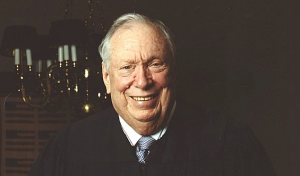 Non-Sequiturs
Non-SequitursNon-Sequiturs: 06.17.18
* Are you paying too much in mutual-fund fees? If you’re paying more than zero, then yes — or so argue Professors William Birdthistle and Daniel Hemel in this interesting and persuasive op-ed. [Wall Street Journal]
* James Comey, FBI director turned author (affiliate link), responds to the criticisms of him in the Inspector General’s report. [Althouse]
* It’s complicated — but just how complicated? Adam Feldman uses word counts and citations to measure opinion complexity during the current Term of the Supreme Court. [Empirical SCOTUS]
* Judge Alex Kozinski (Ret.) pays tribute to the memory of his late colleague on the Ninth Circuit, Judge Stephen Reinhardt. [Concurring Opinions]
* If you’re confused by why the latest Obamacare litigation over the individual mandate matters, since the mandate was rendered toothless by the recent tax reform, Professor Ilya Somin can help. [Volokh Conspiracy / Reason]
* Ethics expert Steven Lubet reviews Ryan Holiday’s book (affiliate link) about the Hulk Hogan/Gawker case — and argues that Peter Thiel’s financing of the litigation might have violated legal ethics. [American Prospect via PrawfsBlawg]
* Thomson Reuters, a leader in applying artificial intelligence in the law — we’re partnering with them on our Law2020 series, exploring how AI is affecting the legal profession — also utilizes machine learning to help people trade cryptocurrencies (among many other use cases). [Artificial Lawyer]
-
 Non-Sequiturs
Non-SequitursNon-Sequiturs: 06.10.18
* What changes might come to the Supreme Court if Justice Kennedy retires at the end of this Term? Adam Feldman scours the justices’ voting relationships for clues. [Empirical SCOTUS]
* Speaking of SCOTUS, when it comes to its recent ruling in Masterpiece Cakeshop, Andrew Siegel is not impressed. [PrawfsBlawg]
* Ilya Somin offers praise for legislation being co-sponsored by Senator Elizabeth Warren — but it will make sense to you once you see the subject matter (hint: her co-sponsor is Senator Cory Gardner of Colorado). [Volokh Conspiracy / Reason]
* Charles Glasser has no problem with people calling out or criticizing speech that they find offensive, but he argues — rightly so, in my view — that we’ve lost “a sense of proportion, a rational relationship between the speaker, their comments, and their role in society.” [Daily Caller]
* Ann Althouse’s take on Bill Clinton’s controversial #MeToo comments. [Althouse]
* Greg Lambert is absolutely right: “Sometimes the change you seek causes problems you didn’t foresee.” [3 Geeks and a Law Blog]
* Smart-contract checker Sagewise hooks up with Hedera Hashgraph, a “blazing fast” alternative to blockchain. [Artificial Lawyer]
-
 Non-Sequiturs
Non-SequitursNon-Sequiturs: 06.03.18
* Which lawyers and law firms scored the most SCOTUS arguments this Term? Adam Feldman has the tally. [Empirical SCOTUS]
* And speaking of the Supreme Court, what can lawyers learn from linguists about Heller and the Second Amendment? [LAWnLinguistics]
* Adam Kolber discusses the phenomenon of “judicial bulls**t” — and wonders whether the justices would fail Philosophy 101. [Daily Journal via PrawfsBlawg]
* Are Justice Neil Gorsuch’s long-winded concurrences contributing to the Supreme Court slowdown this Term? Andrew Hamm crunches some numbers. [SCOTUSblog]
* Many of the major precedents in the school free-speech context feature liberal students — but conservative kids can play this game too. [Volokh Conspiracy / Reason]
* Lex Machina’s latest foray into litigation analytics covers the world of trade secrets. [Dewey B Strategic]
* Relativity: not just for ediscovery anymore. [Artificial Lawyer]
Sponsored

How Generative AI Will Improve Legal Service Delivery


Early Adopters Of Legal AI Gaining Competitive Edge In Marketplace

Legal AI: 3 Steps Law Firms Should Take Now
Sponsored

Is The Future Of Law Distributed? Lessons From The Tech Adoption Curve

Navigating Financial Success by Avoiding Common Pitfalls and Maximizing Firm Performance
-
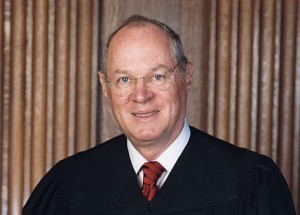 Non-Sequiturs
Non-SequitursNon-Sequiturs: 05.27.18
Ed. note: We will not be publishing on Monday, May 28, in observance of Memorial Day. We will return to our regular publication schedule on Tuesday, May 29.
* What is up with the lively Twitter feed of George T. Conway, former Wachtell Lipton partner and husband of top Trump adviser Kellyanne Conway? It’s not entirely clear — but if you’re not already following GTC, you should be. [Politico]
* Because Masterpiece Cakeshop isn’t the only cake controversy out there: mom tries to get “summa cum laude” written on her son’s graduation cake, hilarity sues. [Althouse]
* Over at the invaluable Take Care blog, you can now find an extensive database of articles addressing impeachment in the Age of Trump — to complement Laurence Tribe and Joshua Matz’s new book about impeachment (affiliate link). [Take Care]
* Is Justice Anthony M. Kennedy about to retire from the Supreme Court? Per Adam Feldman, “signs point to Justice Kennedy remaining on the Court past this term notwithstanding all of the discussion surrounding his retirement.” [Empirical SCOTUS]
* When #MeToo meets defamation claims: a court tosses Tavis Smiley’s libel claim against PBS. [Volokh Conspiracy / Reason]
* “Surprise! Your expert witness has a rap sheet.” And there’s no plug-and-play solution to vetting expert witnesses, as Jean O’Grady explains. [Dewey B Strategic]
* Saira Rao, who helped diversify the world of children’s books, hopes to do the same for politics — by becoming Colorado’s first woman of color elected to Congress. [Teen Vogue]
-
 Non-Sequiturs
Non-SequitursNon-Sequiturs: 05.20.18
* After issuing a TRO to a block a political ad attacking his own allies and campaign donors — “almost certainly an unconstitutional prior restraint,” in the words of First Amendment guru Eugene Volokh — Judge Doug Martin of Arkansas (finally) recuses himself. [Daily Caller]
* Jim Comey’s bestselling book (affiliate link) could cause complications for Robert Mueller and his investigation, according to Joel Cohen. [Law and Crime]
* Which state solicitors general appear most frequently before the Supreme Court? Not surprisingly, Scott Keller of Texas leads the pack, but check out Adam Feldman’s list for other notable names. [Empirical SCOTUS]
* Jean O’Grady shares my admiration for the late Tom Wolfe — and even corresponded with the acclaimed author. [Dewey B Strategic]
* Too few people are willing to take ownership of change — and this is a big problem, as Greg Lambert explains. [3 Geeks and a Law Blog]
* John Fund asks: has the American Law Institute (ALI) strayed from its mission of describing the law and into advocating changes in the law instead? [National Review]
* What is “Old Tweet Syndrome,” and is there a cure for it? Charles Glasser makes a diagnosis. [Daily Caller]
* Adam J. White wonders: Does the Solicitor General’s request for more time to file its reply to Sierra Pacific’s cert petition in the “Moonlight Fire” case suggest that the Justice Department might confess error? [Weekly Standard]
* If you’ll be in Chicago on June 8, please consider coming to the twelfth annual dinner of the Richard Linn Inn of Court, where I’ll be speaking — hope to see you there! [Richard Linn American Inn of Court]
-
 Non-Sequiturs
Non-SequitursNon-Sequiturs: 05.13.18
* An interesting (although depressing) factoid, courtesy of Ed Whelan: this former SCOTUS clerk and prominent Florida litigator has been nominated to the federal bench by three different presidents, but has yet to serve as a judge. [Bench Memos / National Review]
* If you’re an older lawyer and “in transition,” you need to get yourself a “temporary identity,” as Jane Genova explains. [Law and More]
* If you’re interested in the intersection of artificial intelligence and the law, Complex/vLex Canada’s CEO, Colin Lachance, provides a framework for understanding the world of legal AI. [3 Geeks and a Law Blog]
* Jonathan Bernstein offers a rebuttal to my recent New York Times op-ed celebrating the demise of blue slips. [Bloomberg]
* When can creators depict real people without risking liability? The ambiguity of the law on this question poses significant problems, according to Jennifer Rothman, author of a new book (affiliate link) about the right of publicity. [Volokh Conspiracy / Reason]
* Noted media lawyer Charles Glasser wonders: when it comes to covering President Trump, are news editors “confusing the public interest with what is merely of interest to the public”? [Daily Caller]
* Thomson Reuters gets in on the blockchain action, bringing a blockchain-based legal arbitration platform, Kleros, into its Incubator Labs start-up program. [Artificial Lawyer]
* Final reminder: please support the Jersey City Free Public Library — and enjoy some delicious Filipino food by celebrity chef Dale Talde — by joining me on Thursday, May 17, for what should be a great evening! [Jersey City Free Public Library]
-
 Non-Sequiturs
Non-SequitursNon-Sequiturs: 05.06.18
* Congratulations to Quinn Emanuel partner Alex Spiro and Jose Baez, of Casey Anthony fame, on a big win: a full acquittal in the securities-fraud trial of David Demos. [Bloomberg]
* Do you feel that the Supreme Court is taking its sweet time in releasing opinions this Term? Adam Feldman confirms that it’s not your imagination. [Empirical SCOTUS]
* Consovoy McCarthy Park, the elite litigation boutique led by a group of conservative former SCOTUS clerks, welcomes its newest partner: Jeffrey Harris, former associate administrator of the Office of Information and Regulatory Affairs and former law clerk to Chief Justice Roberts. [National Law Journal]
* Are law school graduates getting “good” jobs? Professor Derek Muller has a novel idea: why don’t we ask them? [PrawfsBlawg]
* The Colorado congressional race featuring two NYU Law alumnae, incumbent Diana DeGette and challenger Saira Rao, reflects a divide in the Democratic Party more broadly. [NBC News]
* Criminal defense lawyer Joel Cohen argues against reading too much into an individual’s invocation of the Fifth Amendment — even if the individual happens to be Donald Trump or someone connected to him. [The Hill]
* Criminal defense lawyer Elizabeth Kelley interviews Stanford law professor Paul Goldstein about his biting and funny law school satire, Legal Asylum (affiliate link). [AuthorChats]
* Speaking of books, if you’d like to support the Jersey City Free Public Library — and enjoy some delicious Filipino food by celebrity chef Dale Talde — please join me this Thursday, May 17, for what should be a great evening! [Jersey City Free Public Library]
-
 Non-Sequiturs
Non-SequitursNon-Sequiturs: 04.29.18
* Kirkland & Ellis raiding Cravath is now officially “a thing”; it’s been covered in the newspaper of record. [New York Times]
* Extension requests: not just for law school papers, but for cert petitions too (and there’s no shame in seeking them; they’re often requested by prominent practitioners). [Empirical SCOTUS]
* Want to talk intelligently about the Michael Cohen
messcase with your friends? Start by reading this primer on “privileged” versus “confidential” client communications, by Joel Cohen (no relation) and Dale Degenshein. [Law and Crime]* Boycotts have a venerable history in terms of the law and the First Amendment — but they might be losing their effectiveness in the digital age, as noted media lawyer Charles Glasser explains. [Daily Caller]
* Eugene Volokh flags this interesting issue (and opinion): under what circumstances does denying a felon the right to own a gun violate the Second Amendment? [Reason / Volokh Conspiracy]
* Has the whole “emotional support animal” phenomenon gone too far at Yale? [Yale Daily News via Instapundit]
 David Lat is editor at large and founding editor of Above the Law, as well as the author of Supreme Ambitions: A Novel. He previously worked as a federal prosecutor in Newark, New Jersey; a litigation associate at Wachtell, Lipton, Rosen & Katz; and a law clerk to Judge Diarmuid F. O’Scannlain of the U.S. Court of Appeals for the Ninth Circuit. You can connect with David on Twitter (@DavidLat), LinkedIn, and Facebook, and you can reach him by email at dlat@abovethelaw.com.
David Lat is editor at large and founding editor of Above the Law, as well as the author of Supreme Ambitions: A Novel. He previously worked as a federal prosecutor in Newark, New Jersey; a litigation associate at Wachtell, Lipton, Rosen & Katz; and a law clerk to Judge Diarmuid F. O’Scannlain of the U.S. Court of Appeals for the Ninth Circuit. You can connect with David on Twitter (@DavidLat), LinkedIn, and Facebook, and you can reach him by email at dlat@abovethelaw.com. -
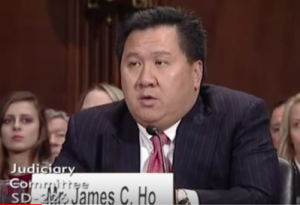 Non-Sequiturs
Non-SequitursNon-Sequiturs: 04.22.18
* Joel Cohen makes the case for appointing a special master to review the attorney-client privilege claims in the case of Michael Cohen (no relation). [Law and Crime]
* A fun profile of Judge Kimba M. Wood (S.D.N.Y.), who’s presiding over the Cohen case — and who “doesn’t need to eat the whole barrel to know it’s not a pickle.” [Politico]
* Circuit judges can play it safe, in the hopes of making it to the Supreme Court someday, or they can be bold (which might help their SCOTUS chances, or might hurt them); Judge James Ho is going for the second approach. [U.S. Court of Appeals for the Fifth Circuit]
* Professor Eugene Volokh: “What is this, Mean Girls: Supreme Court Edition?” [Volokh Conspiracy / Reason]
* Still on SCOTUS, which leading appellate lawyers (according to Chambers & Partners) have the most active practices before the high court? [Empirical SCOTUS]
* What’s the best new legal-information product out there, and what’s the best new product feature or function? Survey says…. [Dewey B Strategic]
* Because having a law school named after him wasn’t enough, Philadelphia trial lawyer Thomas R. Kline is now honored by a giant marble statue. [Philly.com]
* The Wisconsin Supreme Court will decide an important case about academic freedom (and Above the Law gets cited in the amicus brief of the National Association of Scholars — see footnote 29). [Badger Pundit]
* Congratulations to former Miss America winner Deidre Downs Gunn and attorney and writer Abbott Jones on their recent nuptials! [People]
* And congratulations to the recipients of 2018’s Best LGBT Lawyers Under 40 Awards! [LGBT Bar]
-
 Non-Sequiturs
Non-SequitursNon-Sequiturs: 04.15.18
* Has it really come to this? Protesting a nice, nerdy, thoughtful law professor, simply because he questions the constitutionality of DACA (while supporting the DREAM Act)? [Josh Blackman]
* How much should we read into Team Mueller’s reassurance to President Trump that he is a subject rather than a target of its investigation? Not much, according to veteran criminal defense lawyer Joel Cohen. [The Hill]
* How would William Howard Taft have responded to attacks on judges? The POTUS turned SCOTUS chief was quite prescient about judicial independence — as explained by Jeff Rosen, author of a new Taft biography (affiliate link). [Volokh Conspiracy / Reason]
* Speaking of SCOTUS, what’s it like to work in the Solicitor General’s Office? One of the OSG’s newest members, former SCOTUS clerk Jonathan Ellis, pulls back the curtain. [Penn Law via How Appealing]
* How does Justice Gorsuch compare to Justice Scalia — not just in terms of personality, but also in terms of jurisprudence? [Empirical SCOTUS]
* And speaking of Justice Gorsuch, congratulations to Tobi Young, who will be clerking for NMG in October Term 2018 — and who is believed to be the first enrolled citizen of a Native American tribe to clerk for the Court. (By the way, I have another SCOTUS clerk hiring roundup in the works, so please send me your hiring news.) [Chickasaw Nation]
* Are you a healthcare lawyer? You might be interested in this new tool from Bloomberg Law. [Dewey B Strategic]
* Friendly reminder: the Global Legal Hackathon is entering its final stage, and you’re invited — hope to see you on April 21! [Artificial Lawyer]